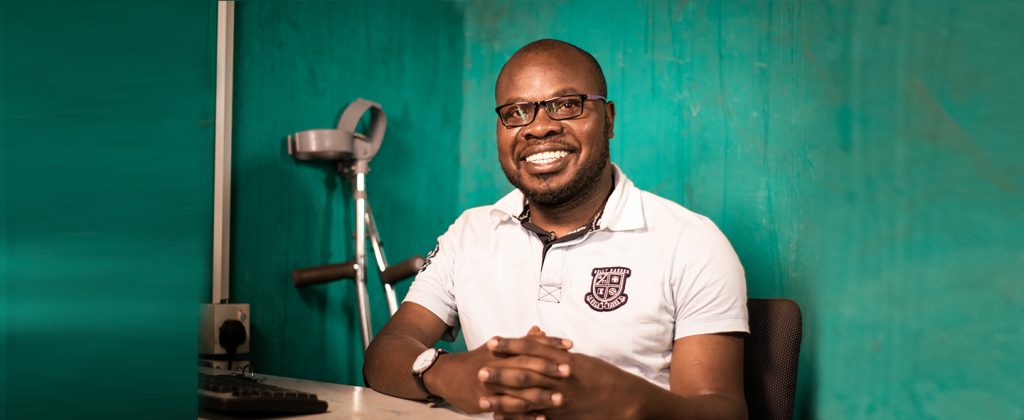
Outside the offices of Disabled Empowerment Society Of Kenya in Gomongo slums, children kick around a ball of football in a cloud of dust. It’s hot. Rusted tin-roofed houses rise all around. Life swirls all around; a man pulling a cart, a lady frying chips by the roadside, a child pushes a used motorcycle tire, a clique of young men hang loosely under a shop’s awning. Joseph Atela – founder of DIESK – stands outside his offices, a nondescript one-roomed rental. He’s holding a phone to his ear. Outside, on an old wall that was once white, announces the NGO with a logo bearing a caricature of a man on a wheelchair and an able-bodied man, all being cusp in caring hands.
Joseph Atela is familiar with this area. Here is where he grew up and was raised. Here is where he witnessed boys he knew – young thugs – getting shot by the police, girls dropping out of school to get married or to be mothers, boys getting into drugs. Death was never too far. He contracted polio when he was four years old and it crippled him. This was even after the fact that he had received his polio shots. “It’s inexplicable, to be honest. Honestly, this event didn’t affect me so much given that I was only a baby.” He says. “I think it affected my parents more.” If Gomongo is challenging for able-bodied persons it’s even worse for a person living with disability. They are largely overlooked.
“The twelve of us in the neighbourhood who were physically disabled got together when I was in university studying human resource and paralegal and together we started a group that had a program for people like us.” He says. “Four of us had tricycles and it was so hard to navigate them in an area like this.” The group got registered in 2015, two years after he finished his degree course. Gaining employment was difficult for someone with a disability. “Nobody wanted to hire me because nobody thought I’d be able to do the job.”
They needed a sustainable model to keep things moving in their new NGO. They started – on top of sports for health and civic education program – a livelihoods improvement program that seeks to raise awareness of capabilities and employability of persons with disabilities and facilitate access to decent work and decent income generation. “We do trainings in entrepreneurship, financial literacy and life skills.” He says. Currently they have a tailoring program where 15 persons living with disability come to learn how to sew. “This is a program supported by KCDF. They take care of all our overheads after they donated seven sewing machines.” There are three men in that group of mostly people with physical disability and mental challenges. One of them presses on the old sewing machine. She looks visually impaired.
She’s Christine Mboli who lost her eyesight in 2012, after a tumor in her head. She was in high school. It started with an eye infection that got out of hand because, who imagines that a simple eye infection can make one lose their eyesight. But soon she started losing his vision. “Blurry vision. I couldn’t focus on images. I’d struggle. Slowly everything faded.” She says. “It’s tough to suddenly find yourself blind. You feel useless and helpless. You get angry, wondering why this had to happen to you. And of course your lifestyle changed because now you can’t go about your life on your own, you have to depend on people.” She says. “And it’s very hard to depend on people for everything when you have always been independent.” The tumor hasn’t been removed but her eyesight will never be regained, according to the doctors. Joining DIESK has helped her bring her life back on track. It engaged her, made her feel purposeful. “I want to learn how to make dresses so that I can start my own business and make my own destiny and depend on myself.” Her journey in readjustment to normal life is still gradual. She recently got a white cane from DIESK which she uses to get about from where she lives with her sister to the DIESK offices.
Andrew Ndegwa walks in the office carrying a plastic bag of fabric. He’s a fun guy; talkative, funny and easy going. He fills the room with his grin and charm. His right hand is missing, chopped from the wrist. “A mob cut it off with a panga on thinking that I was part of the thugs who had just stolen in a house and ran behind my house.” He shrugs. After losing his hand he couldn’t work, so he would rummage through trash and find food which he’d take home to heat and eat. “Life became so hard because my wife also took off at some point. So for the longest time nobody wanted to marry this man with one hand.” He laughs, raising his stubby hand.
“The only people who ever gave me a chance here were these guys [DIESK) and I put my back here because it pays me some money enough to support myself.” He says. “So you see, they have given me dignity, right? Good people, these. So much love here.” She doesn’t earn much from the sale of the clothes that they make (sh 800 a month) but it’s “better than rummaging through a dustbin for half eaten food.”
Andrew has a problem with alcohol addiction and the center tries to engage him to keep him from wandering back into that lifestyle. They treat him like that naughty brother who can’t shut up. Over the sound of the chatter is the whirring of the sewing machines, stitching a different narrative for these men and women.